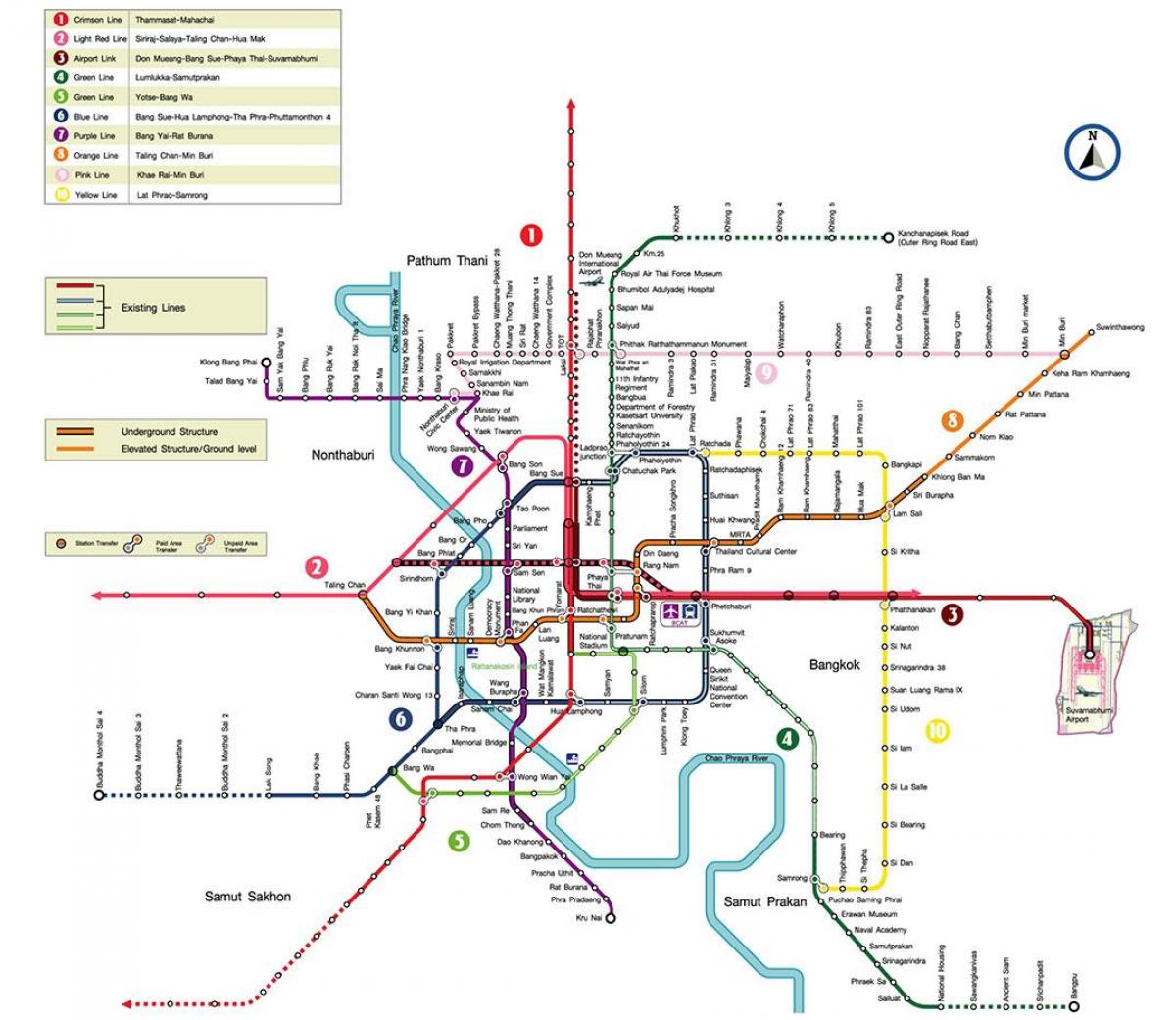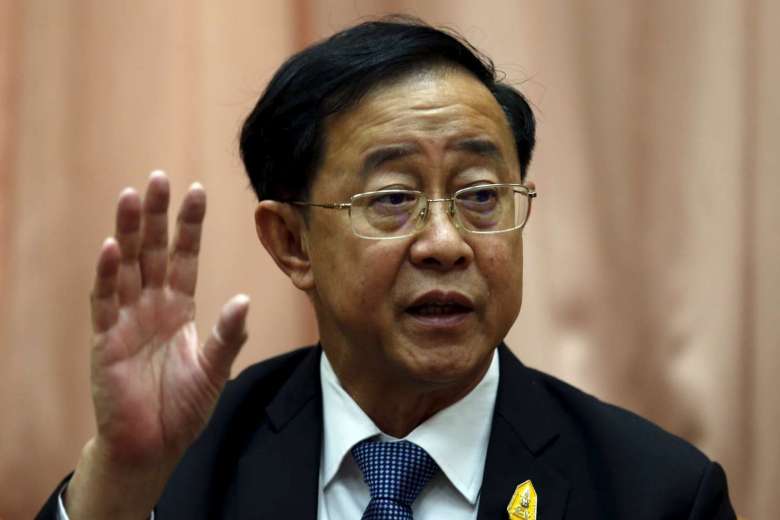Thailand has formally approved an extensive $5.9 billion investment plan aimed at expanding the Bangkok Metro system and enhancing the country's data-center infrastructure. This visionary project seeks to modernize urban transportation and establish Thailand as a leading hub for technology and digital innovation. The approval of this initiative marks a pivotal moment in Thailand's efforts toward sustainable urban growth and digital transformation.
The expansion of the Bangkok Metro system, combined with the development of a cutting-edge data-center network, is set to revolutionize the city's infrastructure and connectivity. Given Bangkok's status as one of the most densely populated cities in Southeast Asia, the demand for efficient public transportation and robust digital infrastructure has never been higher. This project is anticipated to alleviate traffic congestion, shorten travel times, and significantly improve the quality of life for residents.
Aligned with the government's long-term strategic vision, the project highlights Thailand's commitment to becoming a prominent economic and technological leader in the region. By investing in modern infrastructure and digital capabilities, the country is paving the way for sustained growth and innovation. Let us explore this groundbreaking initiative in detail, examining its scope, benefits, and implications for Thailand's economy and society.
Read also:Comprehensive Guide To Arrivals At Jfk Terminal 4
Table of Contents
- Introduction
- Project Overview
- Bangkok Metro Expansion
- Data-Center Network
- Economic Impact
- Environmental Benefits
- Technological Advancements
- Challenges
- Future Plans
- Conclusion
- References
Overview of the Project
The $5.9 billion initiative to expand the Bangkok Metro system and establish a state-of-the-art data-center network underscores Thailand's commitment to modernizing its infrastructure. This comprehensive project includes the construction of new metro lines, upgrades to existing infrastructure, and the development of advanced data centers. These components are designed to enhance connectivity, stimulate economic growth, and attract both domestic and international investors.
The project is expected to create thousands of job opportunities and stimulate economic activity across multiple sectors. Moreover, it will improve accessibility and urban mobility, making Bangkok a more attractive destination for businesses and residents alike.
Key Components of the Initiative
- Construction of new metro lines
- Upgrades to existing metro infrastructure
- Development of a robust data-center network
- Integration of smart city technologies
Enhancing Bangkok's Metro System
A critical aspect of the project involves expanding the Bangkok Metro system to accommodate the growing population and improve urban connectivity. The current metro system already handles millions of passengers daily, underscoring the necessity for increased capacity. The new metro lines will reach previously underserved areas, offering residents greater access to key locations throughout the city.
Furthermore, the expansion will incorporate advanced technology to ensure seamless operations and enhance the passenger experience. Innovations such as smart ticketing systems, real-time traffic updates, and enhanced safety measures will be implemented to provide a more efficient and enjoyable travel experience for commuters.
Benefits of Metro Expansion
- Increased transportation capacity to meet growing demand
- Reduction in traffic congestion and travel times
- Improved connectivity across the city, benefiting both residents and businesses
- Enhanced passenger experience through advanced technology and safety features
Building a Cutting-Edge Data-Center Network
In addition to the metro expansion, the project focuses on creating a comprehensive data-center network that will serve as the backbone of Thailand's digital infrastructure. This network will support businesses, governments, and individuals in their digital endeavors, positioning Thailand as a regional leader in technology and innovation.
The data centers will feature the latest technology to ensure high performance, reliability, and security. They will comply with international standards, making them attractive to global companies seeking to expand their operations in the region. By adopting green technologies and renewable energy sources, the data centers will also contribute to Thailand's sustainability goals.
Read also:Exploring The Kardashians Luxurious Escape To Turks And Caicos
Features of the Data-Center Network
- State-of-the-art technology for optimal performance
- High-performance computing capabilities to support diverse industries
- Advanced security measures to protect sensitive data
- Compliance with international standards for global competitiveness
Economic Implications of the Project
The approval of the $5.9 billion project is expected to have a profound and lasting impact on Thailand's economy. By investing in infrastructure and digital capabilities, the country is positioning itself as an attractive destination for businesses and investors. The project will generate employment opportunities during the construction phase and create long-term jobs in the transportation and technology sectors.
Furthermore, the initiative will attract foreign investment, boosting Thailand's GDP and contributing to its overall economic growth. The improved business environment will make Thailand a more competitive player on the global stage, enhancing its reputation as a hub for innovation and development.
Key Economic Benefits
- Job creation during and after the construction phase
- Attraction of foreign investment, enhancing Thailand's global competitiveness
- Stimulation of economic growth across multiple sectors
- Improved business environment, encouraging entrepreneurship and innovation
Environmental Contributions of the Project
One of the most significant advantages of the Bangkok Metro expansion is its potential to reduce the city's carbon footprint. By providing an efficient and reliable public transportation option, the project aims to decrease the number of vehicles on the road, thereby reducing traffic congestion and air pollution. This shift toward sustainable urban mobility aligns with Thailand's broader environmental goals.
In addition, the data-center network will incorporate green technologies to minimize its environmental impact. These centers will utilize renewable energy sources and implement energy-efficient practices, supporting Thailand's commitment to sustainability and environmental responsibility.
Environmental Advantages
- Reduction in traffic congestion, leading to improved air quality
- Lower levels of air pollution, enhancing public health and well-being
- Energy-efficient data centers contributing to sustainability goals
- Use of renewable energy sources to reduce reliance on fossil fuels
Technological Innovations in the Project
The integration of advanced technology is a cornerstone of this initiative. From smart metro systems to high-performance data centers, the project aims to push the boundaries of innovation in urban infrastructure and digital technology. By leveraging cutting-edge solutions, Thailand is setting a benchmark for other countries in the region, inspiring similar initiatives worldwide.
This project will serve as a model for sustainable urban development and digital transformation, showcasing Thailand's leadership in innovation and technology. The adoption of innovative technologies will enhance the efficiency, reliability, and safety of urban infrastructure, benefiting residents and businesses alike.
Innovative Technologies
- Smart ticketing systems for seamless and convenient travel
- Real-time traffic updates to optimize commuting experiences
- High-performance computing capabilities to support data-driven industries
- Advanced security measures to safeguard critical infrastructure
Addressing Challenges in the Project
While the $5.9 billion project holds immense promise, it also presents several challenges that must be addressed to ensure its success. These include ensuring timely completion, managing costs effectively, and overcoming potential resistance from stakeholders. The complexity of such a large-scale initiative requires meticulous planning and execution.
To mitigate these challenges, the government has established a dedicated task force to oversee the project's progress. This team will collaborate closely with contractors, engineers, and other stakeholders to ensure the project's successful implementation. By addressing potential obstacles proactively, the government aims to deliver the project on time and within budget.
Potential Challenges
- Possible project delays due to unforeseen circumstances
- Cost overruns requiring careful financial management
- Stakeholder resistance necessitating effective communication and collaboration
- Technical difficulties requiring innovative problem-solving approaches
Looking Ahead: Thailand's Vision for the Future
Thailand has ambitious plans to further enhance its infrastructure and digital capabilities in the coming years. The government remains committed to investing in projects that promote sustainable development and technological advancement. These initiatives will shape Thailand's future landscape, positioning it as a leader in innovation and sustainability.
In addition to the current metro expansion and data-center network, future plans include the development of smart cities, renewable energy projects, and advanced transportation systems. These projects will continue to transform Thailand's urban environment, making it a more attractive destination for businesses, investors, and residents.
Upcoming Projects
- Development of smart cities to enhance urban living standards
- Initiatives in renewable energy to reduce carbon emissions
- Advanced transportation systems to improve connectivity
- Technology-driven infrastructure to support modern lifestyles
Final Thoughts on the Project
The approval of the $5.9 billion project to expand the Bangkok Metro system and develop a state-of-the-art data-center network represents a significant milestone for Thailand. This initiative will not only modernize the city's infrastructure and connectivity but will also position the country as a leader in digital innovation and sustainable development. By addressing key challenges and leveraging advanced technology, Thailand is well-equipped to achieve its vision of becoming a regional hub for transportation and technology.
We invite readers to share their thoughts on this transformative project and explore other articles on our site for further insights into Thailand's journey toward sustainable growth and innovation.
References
- Thailand Ministry of Transport. (2023). Metro Expansion Project Overview.
- World Bank. (2023). Urban Development in Thailand.
- International Data Corporation. (2023). Global Data Center Trends.
- United Nations Environment Programme. (2023). Sustainable Urban Development.


